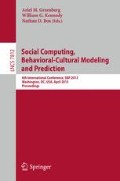Abstract
Social media users have finite attention which limits the number of incoming messages from friends they can process. Moreover, they pay more attention to opinions and recommendations of some friends more than others. In this paper, we propose \(\mathcal LA\)-LDA, a latent topic model which incorporates limited, non-uniformly divided attention in the diffusion process by which opinions and information spread on the social network. We show that our proposed model is able to learn more accurate user models from users’ social network and item adoption behavior than models which do not take limited attention into account. We analyze voting on news items on the social news aggregator Digg and show that our proposed model is better able to predict held out votes than alternative models. Our study demonstrates that psycho-socially motivated models have better ability to describe and predict observed behavior than models which only consider topics.
Access this chapter
Tax calculation will be finalised at checkout
Purchases are for personal use only
Preview
Unable to display preview. Download preview PDF.
References
Blei, D., Ng, A., Jordan, M.: Latent dirichlet allocation. The Journal of Machine Learning Research 3, 993–1022 (2003)
Chua, F.C.T., Lauw, H.W., Lim, E.-P.: Generative models for item adoptions using social correlation. In: TKDE (2012)
Counts, S., Fisher, K.: Taking it all in? visual attention in microblog consumption. In: ICWSM (2011)
Gilbert, E., Karahalios, K.: Predicting tie strength with social media. In: CHI (2009)
Goncalves, B., Perra, N., Vespignani, A.: Validation of Dunbar’s number in Twitter conversations (2011), arXiv.org
Granovetter, M.S.: The Strength of Weak Ties. American Journal of Sociology 78(6), 1360–1380 (1973)
Hodas, N., Lerman, K.: How limited visibility and divided attention constrain social contagion. In: SocialCom (2012)
Kahneman, D.: Attention and effort. Prentice Hall (1973)
Lerman, K., Ghosh, R.: Information contagion: an empirical study of spread of news on digg and twitter social networks. In: ICWSM (2010)
Nallapati, R., Cohen, W.: Link-PLSA-LDA: A new unsupervised model for topics and influence of blogs. In: ICWSM (2008)
Plangprasopchok, A., Lerman, K.: Modeling social annotation: a bayesian approach. ACM Transactions on Knowledge Discovery from Data 5(1), 4 (2010)
Rensink, R., O’Regan, J., Clark, J.: To see or not to see: The need for attention to perceive changes in scenes. Psychological Science 8(5), 368 (1997)
Rosen-Zvi, M., Griffiths, T., Steyvers, M., Smyth, P.: The author-topic model for authors and documents. In: UAI (2004)
Sarwar, B., Karypis, G., Konstan, J., Riedl, J.: Itembased collaborative filtering recommendation algorithms. In: WWW (2001)
Sharara, H., Rand, W., Getoor, L.: Differential adaptive diffusion: Understanding diversity and learning whom to trust in viral marketing. In: ICWSM (2011)
Wang, C., Blei, D.M.: Collaborative topic modeling for recommending scientific articles. In: KDD (2011)
Weng, L., Flammini, A., Vespignani, A., Menczer, F.: Competition among memes in a world with limited attention. Scientific Reports 2 (2012)
Wu, F., Huberman, B.A.: Novelty and collective attention. Proc. the National Academy of Sciences 104(45), 17599–17601 (2007)
Author information
Authors and Affiliations
Editor information
Editors and Affiliations
Rights and permissions
Copyright information
© 2013 Springer-Verlag Berlin Heidelberg
About this paper
Cite this paper
Kang, JH., Lerman, K., Getoor, L. (2013). LA-LDA: A Limited Attention Topic Model for Social Recommendation. In: Greenberg, A.M., Kennedy, W.G., Bos, N.D. (eds) Social Computing, Behavioral-Cultural Modeling and Prediction. SBP 2013. Lecture Notes in Computer Science, vol 7812. Springer, Berlin, Heidelberg. https://doi.org/10.1007/978-3-642-37210-0_23
Download citation
DOI: https://doi.org/10.1007/978-3-642-37210-0_23
Publisher Name: Springer, Berlin, Heidelberg
Print ISBN: 978-3-642-37209-4
Online ISBN: 978-3-642-37210-0
eBook Packages: Computer ScienceComputer Science (R0)

